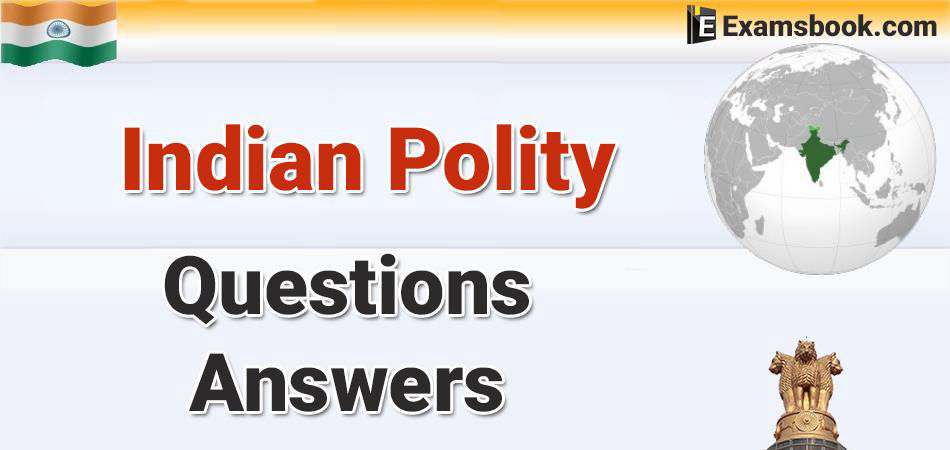Indian Polity Questions for Competitive Exam

Article 75 of the Constitution of India, According to (c) the Council of Ministers is collectively responsible for which of the following?
(A) President
(B) Parliament
(C) Lok Sabha
(D) Rajya Sabha
Correct Answer : C
Explanation :
The ministers are collectively responsible to the Lok Sabha which implies that the Lok Sabha can remove the ministry from office by passing a vote of no confidence.
Which provision of the Constitution empowers the Central Government to provide reservations for the weaker section of society in jobs and educational institutions?
(A) Article 14
(B) Article 16
(C) Article 46
(D) Article 19
Correct Answer : B
Explanation :
The Constitution was amended by the Constitution (77th Amendment) Act, 1995 and a new clause (4A) was inserted in Article 16 to enable the government to provide reservation in promotion.
Which of the following authorities is/are competent to issue writs regarding the enforcement of fundamental rights?
(A) President
(B) Supreme Court
(C) Supreme Court and High Court
(D) Parliament
Correct Answer : C
Explanation :
The Constitution empowers the Supreme Court and High Court with the duty to safeguard the Fundamental Rights of the citizens. The Supreme Court under Article 32 and the High Court under Article 226 of the Constitution can issue Writs for the protection of Fundamental Rights.
In which of the following the presidential (presidential) government is formed?
(A) Fixed term of office
(B) No duplication of the executive among the members of the legislature
(C) Election of the President by popular vote
(D) all of the above
Correct Answer : D
Explanation :
The United States, for instance, has a presidential system.
The following states were formed after 1960. What was the correct sequence of their formation?
1. Haryana
2. Sikkim
3. Nagaland
4. Meghalaya!
(A) 1,2,3,4
(B) 2,3,4,1
(C) 2,4,1,3
(D) 3,1,4,2
Correct Answer : D
Explanation :
In conclusion, the correct chronological order of the formation of the given states is Nagaland (1963), Haryana (1966), Meghalaya (1972), and Sikkim (1975).
How are Members of Parliament replaced in case of death and resignation?
(A) Through by-elections
(B) Through general elections
(C) Both
(D) None of the above
Correct Answer : A
Explanation :
The President of India names an individual as the Prime Minister who is either the head of the gathering which holds a majority share of seats in the Lok Sabha or is an individual who can win the certainty of the Lok Sabha by picking up the help of other ideological groups. Any remaining ministers are named by the President on the counsel of the Prime Minister.
Who among the following is constitutionally empowered to make changes in the Scheduled Areas?
(A) Supreme Court
(B) High Court
(C) Prime Minister of India
(D) President of India
Correct Answer : D
Explanation :
The president is empowered to declare an area to be a scheduled area. 2. The President can increase or decrease its area, alter its boundary lines in consultation with the governor of the state concerned.
The Right to Information Act (RTI) was passed in:
(A) 2002
(B) 2004
(C) 2005
(D) 2008
Correct Answer : C
Explanation :
The Right to Information Act was passed in the year 2005. This law empowers Indian citizens to seek any accessible information from a Public Authority and makes the Government and its functionaries more accountable and responsible.
Who was the first president of the Indian National Congress?
(A) WC Banerjee
(B) Motilal Nehru
(C) Ballabhbhai Patel C
(D) None of these
Correct Answer : A
Explanation :
1. The first President of the Indian National Congress was Vyomesh Chandra Banerjee. He was a Bengali lawyer and social worker.
2. He presided over the first session of the Congress held in Bombay in 1885.
3. Vyomesh Chandra Banerjee was born in Calcutta in 1844. He obtained a law degree from Calcutta University and worked as a lawyer.
In which article of the Indian constitution the administrative relations of the centre-states are given?
(A) 256-263
(B) 250-280
(C) 352-356
(D) None of these
Correct Answer : A
Explanation :
The administrative relations between the Centre and the States are stated under Article 256 to Article 263 of the Constitution of India.



